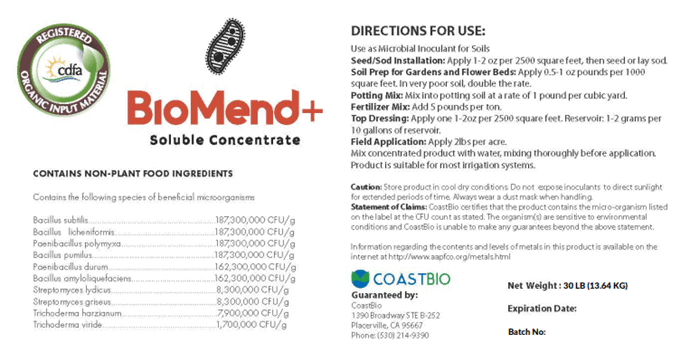BioMend+ is a highly concentrated water-soluble super blend of beneficial bacteria species that have been shown in a large body of research to control for fungus and soil pathogens, stimulate growth, improve water transport within plants, improve biodiversity in the rhizosphere and improve plant tolerance to a variety of biotic and abiotic stresses.
The following are some insights into how inoculants typically work:
Inoculants like BioMend+ contain a mix of beneficial microorganisms. When applied to seeds, roots, or soil, these microbes colonize the plant root zone and establish symbiotic or mutually beneficial relationships with the plant.
Some inoculants contain nitrogen-fixing bacteria, such as certain strains of rhizobia, and bacillus. These bacteria can convert atmospheric nitrogen into a form that plants can use, thereby enhancing soil fertility and promoting plant growth.
Certain microbes present in inoculants, such as mycorrhizal fungi, can solubilize phosphorus in the soil, making this essential nutrient more available to plants. This can be particularly beneficial in soils with low phosphorus availability.
Beneficial microbes can enhance the uptake of nutrients by plants through various mechanisms. For example, they may produce enzymes that facilitate the release of nutrients from organic matter in the soil, or they may improve the root system’s ability to absorb nutrients.
Some inoculants contain microorganisms that can suppress the growth of plant pathogens through mechanisms such as competition for resources, production of antibiotics or antifungal compounds, or induction of plant defense responses. This can help protect plants from diseases and promote overall plant health.
BioMend+ Inoculant works by harnessing the power of beneficial microbes to improve soil health, nutrient availability, and plant growth, ultimately leading to higher yields and better crop quality.
Contact us for more information about BioMend+ Inoculant.
Citations:
Coast Bio Products
National Center Biotechnology Information


